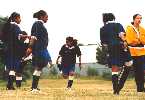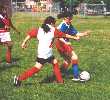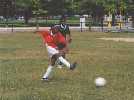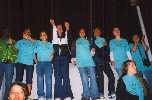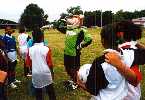| Home | Mission | Schedule | Teams | Volunteer! |
|
Launched in the spring of 1999, CityKicks! is Boston's first-ever after-school soccer program for middle schoolers. We stress participation and fun for all, regardless of ability or experience, and emphasize good sportsmanship and healthy behaviors. Need and Target PopulationBoston CityKicks targets pre-teen girls and boys at Boston public middle schools (ages 10-14), in sections of the City offering little to no organized sports for youngsters. We are focusing on middle schoolers because they need to be headed in the right direction before arriving at high school, with all its new challenges and temptations: they need to have the first-hand experiences and other information to begin choosing healthy lifestyles during pre-adolescence, when they are more open and malleable. Participation in sports helps protect youngsters against early sexual activity, pregnancy, and using alcohol or drugs. Moreover, youngsters will be more likely to continue participating in athletics upon arriving at high school if they already know some basic skills than if they are starting out as a beginner. CityKicks! responds to the growing the need for initiatives to counter the decline in physical exercise and other constructive activities that has been documented to occur among children as they transition from elementary to middle school. It is well established that pre-adolescents need: frequent physical activity, mentoring and guidance, belonging to a group and practice cooperating on a team, and to acquire self-esteem through mastering skills. Youngsters playing organized soccer regularly will have less time for and inclination towards “negative leisure” and risky behaviors; they will grow more concerned for their bodies' well-being and make healthier choices; they will experience the rewards of effort, self discipline, and courage; and they will come to better appreciate fair play, cooperation, and the value of rules. CityKicks is pioneering an effective method for addressing the crying need of inner-city/Boston's 10- to 14-year-olds for more purposeful physical activity in their lives. Boston youth have only one-third as many opportunities to participate in sports as their suburban counterparts enjoy. Nearly two-thirds of those meager opportunities occur in just two sports: basketball or baseball/softball; the public middle schools offer intermurals only in basketball and track. Soccer, despite its world-wide popularity, accounts for only 7.5% of Boston youth sports oportunities. In contrast to the 85% of suburban youngsters who play soccer, barely 5% of Boston's 100,000 school-aged youngsters do. And although 84% of Boston public school students are non-white (including Hispanic and Asian), only 20% of the Boston youngsters playing soccer are non-white. The realities and challenges of the urban setting have prevented youth soccer from mushrooming up from the grassroots in the city as it has in the suburbs, where parents understand the value of participation and have the resources to organize, equip, transport and coach their children. For youth sports to take root in the inner city, planners must factor in the obstacles and hardships of inner-city living for families and implement a different model than the traditional parent volunteer format. Now serving over 100 girls at 8 of Boston's 25 middle schools, CityKicks! has demonstrated how to structure this essential framework effectively and maximize participation - through a school-based delivery model. Goals and Rationale of the ProgramCityKicks! aims to promote an active, healthful lifestyle among inner-Boston pre-teens, especially girls, by engaging them in an appealing recreational physical activity, whereby they become “turned on” to the exhilarating and contagious fun of regular active play and acquire the “habit” of frequent physical activity. In addition, their participation will be enriched by instruction and outreach to parents around healthy development and smart choices, to deepen their appreciation of the lifelong benefits of regular physical activity. Through this strategy, the program further seeks to accomplish the following complementary goals for its target population:
Lastly, by getting our targeted youth into playing a recreational team sport, we seek to give them added incentive to stay connected to school, thus increasing their future options and opportunities. We want to equip them to continue pursuing positive and healthful after-school activities all the way through high school. Method: Program and ProceduresCityKicks has selected the development of a school-based, weekday afternoon, developmental/recreational soccer league as a low-maintenance (ultimately), high-return means to achieve the foregoing goals. We believe soccer to be an optimal physical activity for our target population because:
In addition, the middle schools do not presently offer any intermural sport in the fall, and soccer is well-suited to being played in fall weather. The surging popularity of soccer with American children who do experience exposure and access to it - not to mention its preeminence in the native countries of our immigrants - promises great untapped potential for soccer as a means of getting inner-city kids “up and moving” into a more active, healthy, lifestyle. We are starting with a school-based format for two main reasons: First, most inner-city parents are struggling with low incomes, atypical work hours, greater numbers of children, language barriers, etc. and often have other values and priorities ahead of their children's “extra-curricular enrichment”. The organizing of teams, practices, leagues, game schedules, field permits, and referees does not occur unless the infrastructure - the coaching, transportation, equipment, and coordination - is built in at a real cost, and not dependent on parents' ability to volunteer and/or pay. Secondly, the youngsters are already congregated at school, and it would be much harder to re-engage them and convene a team once they have dispersed to their different neighborhoods, often after a lengthy bus ride. With most middle schools dismissing at 1:30 pm, the hour or so immediately following, at the school site, is the venue best suited to maximizing participation by our target population. Our methods and procedures for pursuing our objectives have demonstrated their validity through three successful seasons now. With the benefit of this experience, our plan for the coming school year is to add four more girls' teams/sites this fall, including one or two based at a YMCA, Boys & Girls Club and/or Community Center. Then in the spring (2001) we will introduce a pilot league of 4-6 boys' teams, while continuing the girls' teams for a second season. Following are the highlights of how we will accomplish this:
|

